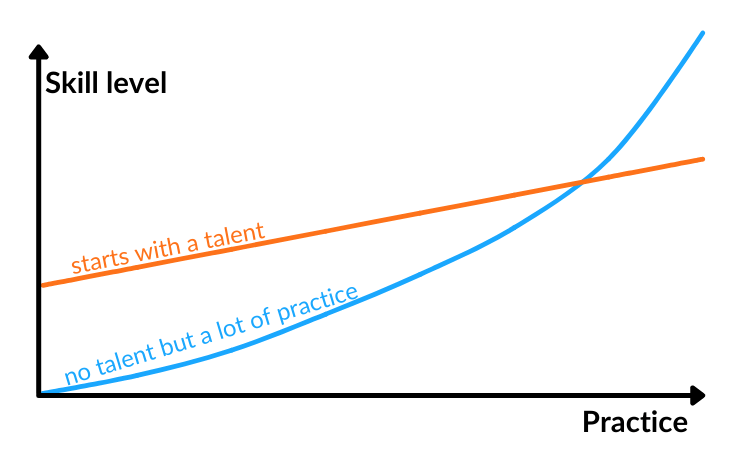Wondering if you have any talents and if so, what those are?
Many people downplay the idea that they have talents.
But everyone does.
There are just many different kinds of talents people never even consider.
In this article, we will explore the different kinds of talent. And then give you a list of 67 talent examples to help you uncover your own.
So let’s dive in!
What is talent?
Talents are the skills, mental strengths, and abilities that come naturally to you and give you a competitive advantage over others.
Because by definition, talent means that someone is naturally good at something, you can say that people are born with talents.
What are your superpowers?
Take this free personality test to uncover your personal blueprint for success and happiness. Within minutes, you gain insights into your personality and strengths, allowing you to experience more fulfillment and joy.
Discover your strengths today
So can you learn talent?
The answer is no. You cannot learn a talent because it is defined as the abilities that come naturally to you.
That said, you should not let the definition of talent define your limits.
Just because you may not be talented in an area does not mean that you cannot develop yourself and achieve excellence.
Quite the contrary.
Talent vs skill
While talent is something that you are born with (or what you naturally excel at), a skill is something that you can develop through practice.
The advantage of leaning into your talents is that it gives you a headstart in that area. But to achieve success, everyone needs to put effort and practice into the development of the skill.
In other words, talent alone does not guarantee success.
Consistent effort towards developing a skill does.
There are many instances of successful people and elite athletes who didn’t have talent, yet became the very best at what they did. Like basketball player Kobe Bryant, for example.

Here’s the deal: talent gives you a competitive advantage, but from that point on, hard work takes over.
That said, it pays to find your talents and use them to your advantage.
So let’s figure out where yours lay.
5 Types of Talents
The area that comes to mind most often when you talk about talents is specific skills.
Think about playing the piano or chess, for example.
But you can also think about general skills, measured with IQ tests. And what about social talents?
In my research, I discovered 5 kinds of talent categories:
- Self-conceptual talents – like self-awareness, self-regulation, self-motivation, and self-confidence.
- Social talents – like social awareness, communication, relationship management, collaboration, and influence.
- General talents – like language skills, mathematical abilities, reasoning, visual-spatial processing, and learning abilities.
- Specific expertise – like strategic thinking, arts, writing, research, sports, design, storytelling, and kinesthetic abilities.
- Fun talents – any cool talents such as exceptional taste, ventriloquism (ability to make your voice appear from somewhere else or with delay), and hypermobility, to name a few.
Do you already have an idea in what categories your talents lay?
Maybe you even have many talents in a variety of categories. Either way, here is a list of talent examples to help you find yours!
List of 67 talent examples
Remember that any of the following examples are skills, mental strengths, and abilities that you can improve and develop.
That said, if you naturally excel in some of the talent examples, you can consider these to be your talents.
Self-conceptual talents
- Self-awareness – you have a strong awareness of your thoughts, emotions, feelings, and actions.
- Self-regulation – you can manage and control your thoughts, emotions, and actions in any situation.
- Self-motivation – you enjoy a high drive and motivation and are naturally being proactive.
- Positive attitude – you maintain a positive outlook and attitude regardless of the circumstance.
- Stress management – you can handle and manage stress well.
- Self-confidence – you enjoy all types of confidence, like high self-esteem.
- Resilient – you recover from setbacks with ease.
- Responsible – you take responsibility for your actions (the opposite is that you blame others or situations).
- Patient – you can tolerate delays without becoming annoyed or anxious by them.
- Intuitive – you naturally feel what is right.
- Energetic – you are very involved with others and tasks.
Social talents
- Social awareness – you understand social situations and can understand them from someone else’s perspective.
- Social confidence – you exert confidence under social pressure while giving presentations, for example.
- Verbal communication – you are able to vocally bring your point across in a way that is easily understood by others.
- Written communication – similar to verbal communication, but in this case through written mediums, like email.
- Storytelling – your natural style is to bring points across in the form of a story and can do so effectively.
- Relationship management – you quickly develop and maintain healthy relationships and connections.
- Conflict management – you stay calm during conflict and can resolve arguments effectively.
- Cooperative – you easily find common ground in working together towards common goals.
- Active listening – you are able to listen to, reflect on, and respond accordingly to others during a conversation.
- Empathy – you understand and share the feelings of others.
- Accountable – you do what you say and agree on.
- Intimate – you make others feel comfortable and easily connect with them on a deeper level.
- Persuasion – you influence the choices and behavior of others.
- Leadership – you can rally people behind an improved vision of the current situation.
- Assertive – you stand up for your values and beliefs and express your thoughts and feelings towards others.
- Honest – you speak truthfully even when that is difficult or seemingly unfavorable for you at that moment.
Talents in general
- Language – you have the gift of identifying, learning, and speaking languages relatively easily.
- Math – you have a high understanding of abstract ideas.
- Memory – you can remember and recall high volumes of information and/or visuals.
- Reasoning – you excel at reasoning with logic.
- Visual-spatial processing – you are able to access where objects are in space with high precision.
- Creativity – you excel at using imagination to create something.
- Organizational skills – you can manage energy, focus, time, and space in a way that enhances focus and productivity.
- Problem-solving – you can identify a problem and its cause and formulate, prioritize, and select the best solutions.
- Decision-making – you understand problems, research potential solutions, and make the best decision to solve the problem.
- Learning abilities – you learn anything fast through either auditory, visual, or kinesthetic learning.
Talents in hard skills
Talents in hard skills often come from combining the talents we already discussed. But you may find it easier to recognize yourself in these examples.
- Artistic skills – you excel at creating works of art.
- Design skills – you understand what something will look like in the future and are able to realize that result.
- Strategic skills – you see the big picture and are able to generate advantageous plans for the future.
- Innovative skills – you exploit ideas to generate value.
- Executional skills – you enjoy the day-to-day process and excel at performing and achieving tasks.
- Planning skills – you are able to effectively manage activities with the available resources.
- Presentation skills – you are able to bring your point across to a group of people in the form of a presentation.
- Project management skills – you organize, communicate, and manage projects effectively.
- Writing skills – you are able to write well, express your point through the written word, and create an image in the readers’ minds.
- Research skills – you excel at collecting, analyzing, and interpreting information to find an answer or solve a problem.
- Teaching skills – you are able to create a positive learning environment and effectively help others to understand ideas.
- Musical skills – you are able to sense, understand, follow, and produce musical elements like melody and rhythm.
- Marketing skills – you excel at interesting others for an offer by creating, communicating, and delivering value.
- Technical skills – you excel in areas where a high understanding is required to perform practical tasks, like science and engineering.
- Computer skills – you understand and excel at working with computing devices and their software and applications.
- Financial skills – you understand how money works and are exceptional at money management and/or bookkeeping.
- Entrepreneurial skills – you easily discover and utilize commercial opportunities in the market.
- Kinesthetic skills – you shine in hands-on activities as a result of exceptional motor skills, bodily awareness, and perfect coordination.
- Analytical skills – you are effective in collecting, analyzing, and acting on information and data to solve problems.
Fun and cool talents
Here is a fun list of talents that I’ve found. By no means is this a complete list, but it might help you discover any cool talents you may have.
- Exceptional taste – you are able to distinguish flavors with ease, which can benefit you with stuff like wine tasting or understanding the ingredients in food recipes.
- Ventriloquism – you are able to make your voice appear from somewhere else or with delay.
- Hypermobility – you are exceptionally mobile, which could help you excel in performance acts, like magic.
- Voiceover – you are able to speak in many different voices, accents, and/or dialects.
- You can recognize fonts.
- You are able to talk or read backwards.
- The ability to move body parts independently.
- You can cry on command.
- Solve a Rubix cube with your feet (or just in general).
- Being able to sing along with songs after you hear them once.
- You can switch between normal and slow motion.
- And many more to name…
What’s next?
Everyone has some talents – and so do you.
And I hope this list of talent examples helped you find yours. But if not, don’t worry. After all, talent only offers a head start.
Key takeaways:
- Talents are the skills, mental strengths, and abilities that come naturally to you, providing a small competitive advantage.
- While talent offers a head start, skill development still requires a lot of deliberate practice, hard work, and persistence.
- Finding something you enjoy is more important than finding your talent. Passion and perseverance encourage consistent effort, making them the main ingredients to achieve mastery.
Useful resources to dive deeper into this topic include:
- Take a free personality test to uncover your traits, values, beliefs, and even your strengths.
- Take a strengths assessment to dive even deeper into your strengths.
- Conduct a personal SWOT analysis, a helpful self-assessment test.
Take action: Take the time to reflect and identify your own talents. What do you get compliments about? What requires little effort that others struggle with? What do you consider your competitive advantage? Combine your answers with that of a strengths test, and identify complementary skills that you could develop.
Do you want to lean into your talents and strengths to unlock more fulfillment in your life and career? Sign up below to get access to weekly personal development tips to live your most authentic self.

